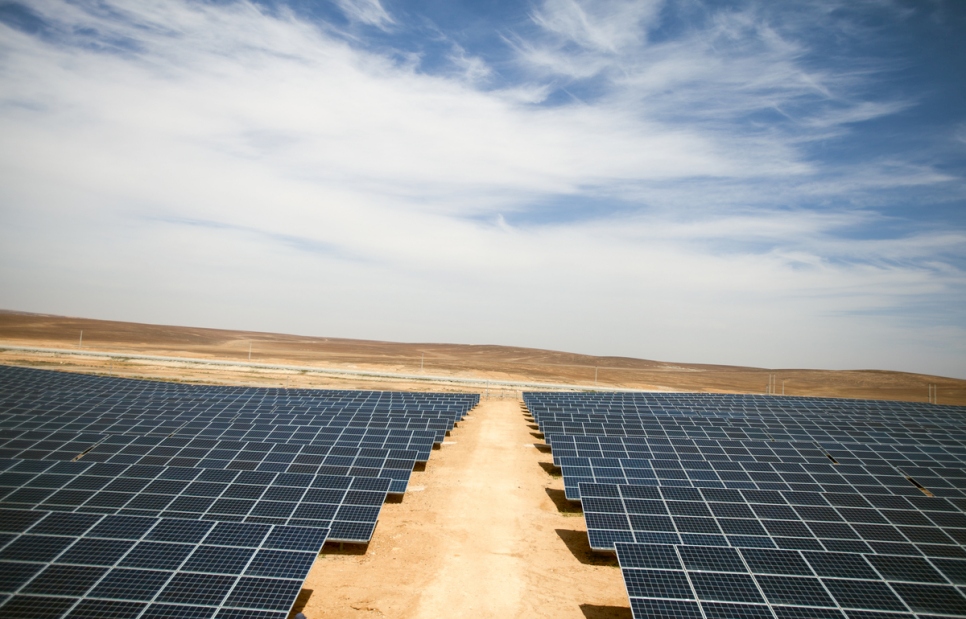Azraq, the world's first refugee camp powered by renewable energy
Joint UNHCR/IKEA Foundation
The UN Refugee Agency, UNHCR, switched on today the newly constructed solar plant in Jordan’s Azraq refugee camp. Funded by the IKEA Foundation’s Brighter Lives for Refugees campaign, the solar farm has brought renewable power to a population that lived for two and a half years with only sporadic access to electricity and will contribute to the Jordan national energy strategy to achieve a green economy by 2020.
The 2-megawatt solar photovoltaic (PV) plant will allow UNHCR to provide affordable and sustainable electricity to 20,000 Syrian refugees living in almost 5,000 shelters in Azraq camp, covering the energy needs of the two villages connected to the national grid. Each family can now connect a fridge, a TV, a fan, have light inside the shelter and charge their phones, which is critical for refugees to keep in contact with their relatives abroad.
Azraq camp opened its doors in April 2014 and is located in a desert area in northern Jordan, with hot summers and harsh winters. The lack of electricity has been one of the main challenges faced by its residents, making daily activities difficult, such as cooking, washing the clothes, studying or walking safely to the washroom at night, especially for women and children.
The introduction of electricity in January 2017 addressed these challenges and significantly improved the well being of Azraq residents. For the last two and a half years, refugees have been living with the sole support of solar lanterns distributed on their arrival and street lights installed in one of the villages, both funded by the IKEA Foundation.
The Azraq’s solar farm is the first solar plant built in a refugee setting in the world. In Jordan, where the cost of electricity is high, the solar plant will allow UNHCR to provide electricity to Azraq camp residents free of cost, savings that will be invested in other needed assistance.
The solar farm will result in immediate savings of US$ 1.5 million per year and it will reduce CO2 emissions by 2,370 tons per year. Once the solar plant is upgraded from 2 to 5 Megawatts and operating at full capacity, it will increase these savings and reduction in CO2 emissions and cover all of Azraq’s energy needs. Connected to the national grid, any extra electricity generated will be sent back free of cost, supporting the host community energy needs.
The construction of the Azraq solar plant has also meant an income opportunity to over 50 refugees who have been trained and employed to help build the solar farm under the supervision of the Jordanian solar company Mustakbal, which led the works on site. Some of these refugees will be also in charge of the maintenance works in the future.
“Today marks a milestone. Lighting up the camp is not only a symbolic achievement; it provides a safer environment for all camp residents, opens up livelihoods opportunities, and gives children the chance to study after dark. Above all, it allows all residents of the camps to lead more dignified lives,” said Kelly T. Clements, UNHCR Deputy High Commissioner. “Once again the partnership between IKEA Foundation and UNHCR has shown how we can embrace new technologies, innovation and humanity while helping refugees.”
The solar plant, which cost 8.75 million euros, has been entirely funded by the IKEA Foundation through the Brighter Lives for Refugees campaign that raised 30.8 million euro for UNHCR projects. For each LED light-bulb sold during the campaign period, the IKEA Foundation donated 1 euro to UNHCR to bring renewable energy and education to refugees.
“The world’s first solar farm in a refugee camp signals a paradigm shift in how the humanitarian sector supports displaced populations. UNHCR Jordan will save millions of dollars, while reducing carbon emissions and improving living conditions for some of the world’s most vulnerable children and families”, said Per Heggenes, CEO of the IKEA Foundation. “We are very grateful to everyone involved – especially the IKEA customers and co-workers who took part in the Brighter Lives for Refugees campaign, the UNHCR, the Jordanian government, EDCO, and most of all, the Syrian and Jordanian people who made this project a reality”, he concluded.
Providing renewable energy sources to refugees and their host communities is one of the priorities for UNHCR globally. Innovative partnerships such us the one with IKEA Foundation help UNHCR find forward looking and sustainable solutions for the refugee community.
For more information please contact:
- English: Olga Sarrado Mur, UNHCR External Relations, sarrado@unhcr.org, +962 79 761 7799
- Arabic: Mohammad Hawari, UNHCR External Relations, hawari@unhcr.org, +962 79 895 6781
- Radu Dumitraşcu, Communications Manager, IKEA Foundation, radu.dumitrascu@ikeafoundation.org, +31 6 556 98 570

